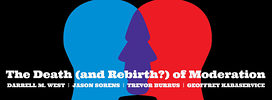As an undergraduate, I majored in political science and hated it. To me, it seemed like a retelling of history from which living, breathing human beings had been abstracted out. So when I set out to write a history of moderate Republicans, I paid considerably less attention to how the political science literature described them than I did to how they described themselves.
This experience came to mind while reading Jason Sorens’s definition of moderation. “Political moderation,” he writes, “should not be confused with tolerance, pragmatism, willingness to compromise, resistance to political tribalism, or open-mindedness.” Unfortunately for Sorens’s argument, this in fact is how virtually all moderates I wrote about defined themselves. Sorens claims that moderation in politics instead attempts to find “a middle ground between viewpoints” and “seeks to average over the political alternatives on offer in a particular society at a particular time.” Precisely none of the moderates I dealt with would have defined their outlook in that way. The contention that “[m]oderation is necessarily bound by time and place” is true but meaningless; the same could be said of liberalism, conservatism, and just about any other political outlook one cares to mention.
Given that there is no overlap between Sorens’s conception of moderates—which in broad outline is shared by numerous other critics of moderation—and moderates’ self-conception, it seems futile to argue point-by-point against his verdict that moderation has little to recommend it. One might note, however, the historical reality that Martin Luther King Jr. at various points defined his non-violent, civil-disobedience approach to dismantling segregation as moderate as well as radical; that moderate Republicans were among the foremost advocates of civil rights in Congress; and that both the Civil Rights Act of 1964 and the Voting Rights Act of 1965 were products of the tolerance, pragmatism, and willingness to compromise that characterized moderation in political action.
As for Sorens’s broader argument that political polarization is a good thing in that it gives voters a clearer choice of alternatives and (once the pesky filibuster is abolished) will overcome present political gridlock and dysfunction, that seems a recapitulation of the central recommendation of the American Political Science Association’s 1950 report, “Toward a More Responsible Two-Party System.” The report called for more centralized, ideologically defined political parties, on the grounds that this was the best way to pass more effective, executable programs. But as Sorens himself recognizes, ideological polarization has not led to a more effective Congress but the reverse. The disappearance of moderation from the Republican side and (as Darrell West points out) its erosion on the Democratic side has given us a Congress that is incapable of passing a highway bill, let alone taking action on the more intractable and devastating problems that confront the nation.
Trevor Burrus’s invocation of abolitionist William Lloyd Garrison’s broadside against moderation and compromise has resonances he may not have considered. Garrison believed that the evil of slavery meant that civil war was preferable to moderation. Are we in an analogous situation now? Yes, according to a growing number of right-wing Republicans and religious fundamentalists who believe that abortion (among other moral issues) will precipitate a new civil war. Burrus suggests that the only way to avoid internecine strife over issues like abortion is to repeal Roe vs. Wade and allow states to make their own rules—ideally, perhaps, in a para-national entity restored to sort of governance that prevailed in the halcyon era of the Articles of Confederation. But in which states, one wonders, will there be such harmonious ideological consensus that abortion will no longer be a contentious moral issue? None that I can think of, and certainly not in states like Alabama and Missouri where Republicans are currently seeking to criminalize and eliminate abortion.
The conservative leader William Rusher was no fan of political moderation, but even he realized that such a “highly pluralistic” democracy as America “requires constant compromise among people who differ passionately.” He warned anti-abortion activists that “a position that by its very nature cannot be compromised is therefore a constant menace to the health and stability of the body politic.”
In his 1960 work Parties and Politics in America, political scientist Clinton Rossiter famously declared: “No America without democracy, no democracy without politics, no parties without compromise and moderation.” If the enemies of compromise and moderation ever should get their way, I fully expect that the eventual result would be the demise of every other link in that chain: parties, politics, democracy, and America.

